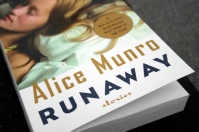


A L L R I G H T S R E S E R V E D © 2 0 1 4 C A N A D A E X C L U S I V E
D e s i g n R A Y P H O T O s t u d i o, C r e a t e d b y WEB -
CANADA Exclusive
Mariánska 12
811 08 Bratislava
Slovak Republic
Tel.: +421 252 932
895
Fax: +421 252 932 896
Cell: +421 911 424 435
[email protected]
ALICE MUNRO
 The Nobel Prize in Literature 2013 was awarded to Alice Munro „master of the contemporary
short story.“ She became the first Canadian and only 13th woman to take the award
since its lunch in 1901. Her work has been described as having revolutionized the
architecture of short stories, especially in its tendency to more forward and backward
in time.
The Nobel Prize in Literature 2013 was awarded to Alice Munro „master of the contemporary
short story.“ She became the first Canadian and only 13th woman to take the award
since its lunch in 1901. Her work has been described as having revolutionized the
architecture of short stories, especially in its tendency to more forward and backward
in time.
Munro was born Alice Ann Laidlaw in Wingham, Ontario in July 10th 1931.
Her father was a fox and mink farmer and her mother a schoolteacher. Munro began
writing as a teenager, publishing her first story The Dimensions of a Shadow in 1950
while studying English and journalism at the University of Western Ontario in London
under a two-
In 1979 to 1982 Munro toured Australia, China and Scandinavia. In 1980
held the position of writer in residence at bouth -
Alice Munro's highly acclaimed first collection of stories, Dance of the Happy Shades (1968) won the Governor General's Award, Canada's highest literary prize.. That succes was followed by Lives of Girls and Women (1971). Munro's collection of stories Who Do You Think You Are? was published also as The Beggar Maid in U.S.A. This book earened Munro a second Governor General's Award in 1978, also in 1986 for The Progress of Love.
The Bear Came Over the Mountain – about erderly couple grappling with infidelity-
(2006), was the favourite of the permanent secretery of Swedish Academy.
Alice Munro's works have appeard frequently in publications such as The New Yorkers, The Atlantic Monthly, The Paris Review. Her collections have been translated into thirteen languages. Some critics have asked whether Munro actualy writes short stories or novels. Alex Keegan, writing in Eclectica, gave a simple unswer: „Who cares? In most Munro stories there is as much as in many novels.“
Munro's excellence has been recognized with numerous prestigious awards including the Man Booker Prize (1980) for The Beggar Maid, Too Much Happines (2009). The Giller Prize – for the Love of a Good Women (1998), Runaway (2004), PEN/Malamund Award for Excellence in Short Fiction (1997), National Book Critics Circle Award (1998, U.S.) for The Love of a Good Woman, Commonwealth Writers Prize and many others.
Alice Munro in 2010 was conferred a medal Knight of the Orde of Arts and Letters, order of France, for her literary contribution.
Maria Chrappa

An interview with Alice Munro
What draws you to short stories as opposed to novels? What do you find that the shorter
form enables you to do that a novel perhaps would not?
I seem to turn out stories
that violate the discipline of the short story form and don't obey the rules of progression
for novels. I don't think about a particular form, I think more about fiction, let's
say a chunk of fiction. What do I want to do? I want to tell a story, in the old-
Sometimes I get the start of a story from
a memory, an anecdote, but that gets lost and is usually unrecognizable in the final
story. Suppose you have-
I've been using a computer for a year-
It's not possible to advise a young
writer because every young writer is so different. You might say, "Read," but a writer
can read too much and be paralyzed. Or, "Don't read, don't think, just write," and
the result could be a mountain of drivel. If you're going to be a writer you'll probably
take a lot of wrong turns and then one day just end up writing something you have
to write, then getting it better and better just because you want it to be better,
and even when you get old and think "There must be something else people do" you
won't quite be able to quit.
What writers have most influenced you and who do you
like to read?
When I was young it was Eudora Welty, Carson McCullers, Katherine Anne
Porter, Flannery O'Connor, James Agee. Then Updike, Cheever, Joyce Carol Oates, Peter
Taylor, and especially and forever, William Maxwell. Also William Trevor, Edna O'Brien,
Richard Ford. These I would say are influences. There are dozens of others I just
like to read. My latest discovery is a Dutch writer, Cees Nooteboom. I hate doing
lists like this because I'll be banging my head soon that I left somebody wonderful
out. That's why I speak only of those who have influenced, not of all who have delighted
me.
Cynthia Ozick has called you "our Chekhov." How does that comparison make you
feel?
I have recently re-
I always
have to know my characters in a lot of depth-
I don't think
of myself as being in any way an interpreter of rural Ontario, where I live. I think
there's perhaps an advantage living here of knowing more different sorts of people
than you would know in a larger community (where you'd be shut up, mostly, in your
own income or educational or professional "class"). The physical setting is perhaps
"real" to me, in a way no other is. I love the landscape, not as "scenery" but as
something intimately known. Also the weather, the villages and towns, not in their
picturesque aspects but in all phases. Human experience though doesn't seem to me
to differ, except in fairly superficial ways, no matter what the customs and surroundings.
Memory plays a key role in many of your stories. What is it about the power of memory
and how it shapes our lives that most intrigues you?
Memory is the way we keep telling
ourselves our stories-
I always like the story I'm trying to write at the moment the
best, and the stories I've just published next best, In my new book, I'm very attached
to "Save the Reaper" and "My Mother's Dream." Among the older ones, I like "Progress
of Love" and "Labor Day Dinner" and "Carried Away" a lot. And actually many others.

s p e c i a l


